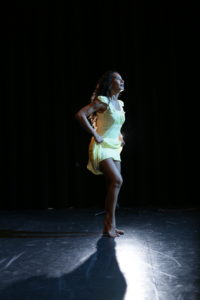We are pleased to announce our Spring 2024 interns at A&BC! Our internship program is…

Social Justice, Socially Distant: Reflections on the Present from Marsha Parrilla
 What does a socially distanced dance company look like? Marsha “Mar” Parrilla, founding artistic director of Boston-based dance company Danza Orgánica, has a few ideas.
What does a socially distanced dance company look like? Marsha “Mar” Parrilla, founding artistic director of Boston-based dance company Danza Orgánica, has a few ideas.
Danza Orgánica held its last in-person rehearsal on March 13th, but with the opportunity to continue meeting via Zoom, progress for the company has not slowed down. Rather, it has pushed Mar to reorient herself and her focus. Beginning in late March, Mar’s rehearsals transformed from conventional, movement-based meetings into occasions for reflection and conversation.
“When we create a new work, we go off on a journey,” Mar explained. “As an artistic director, I don’t always have a clear idea of what I want at the end – what I want it to look like or what the outcome needs to be. A lot of this comes from my studies in dance education with Ted Warburton at NYU. He taught us that when you do research you explore absolutely everything, and then you start to sift through until you get to the end. That’s always stuck with me. So, when we create a work as a company or when working with another group, we explore the whole scope of the topic, and then we start to narrow it down. How does it feel in the body, what is the spirit telling us, and what is the direction we need to go?”
Mar recognizes the company’s recent need for collective and individual processing in light of the Black Lives Matter movement and the disproportional effect the COVID-19 pandemic has had on Black and Brown people in the United States.
“My creative brain was taking in so much that I wasn’t really creating anything new,” Mar explained. “I felt a lot of grief at the beginning for my Black and Brown people who are disproportionally affected by this. And, you know, I just went into thinking broadly how this is affecting people that are marginalized, under-resourced, or live in unsafe situations.”
COVID-19 has changed the world, and Mar does not take that lightly when it comes to envisioning the work she wants to present.
“I believe there are some styles that are more codified,” she shared, “and you can say, ‘Here are the steps, learn the combination, and then we are going to do a show.’ But here, we go deep into storytelling, and the stories are not already created. We are creating the stories together, and that takes time. Going through emotions and going through a process, for it to be properly honored, we need to have that flexibility in time, in space, that is not fixated on product.”
In response to the struggles of Black, Indigenous, and People of Color (BIPOC) around the world and her personal struggle to find creative productivity, Mar has taken this opportunity to reevaluate the company’s mission, values, and goals. Danza Orgánica has always been committed to social justice for BIPOC by amplifying their voices in the dance community, but Mar’s time to reflect has allowed the company to make that mission even more clear.
“This is a big opportunity for us as Black and Brown people, and as artists of color, to continue to explore work that will resonate even more with communities,” Mar explained. “We want to look not just towards an anti-racist future, but an anti-colonial future, and an anti-patriarchal future. How can we embed our dreams and really push through a future that feels liberating for all oppressed people, rather than some?”
In addition to working with dancers in the Boston Area, Danza Orgánica is collaborating with dancers in Puerto Rico. Hailing from Puerto Rico uniquely informs Mar’s view of the current moment of racial violence and civil unrest.
“I was born and raised in a colony,” she shared, “and now I live in the United States. I’m constantly looking for a liberated future as a person of color here in the United States also. So, I’m seeing that the issues that we are dealing with both here and in my country are mainly related to being colonized people. I feel like there are multiple movements of intersectionality. Obviously, there’s a focus on Black Lives Matter, which really needs to be honored. Black Lives Matter comes from the system of racism, and all of those systems that were also brought up by colonialism. Whiteness was created. It was an invention in order for humans to be able to oppress others. So, if we can start really tapping into those origins and really see why we are where we are, a lot of those intersectionalities will appear.”
Mar has collaborated with dancers in Puerto Rico for a number of years and continues to do so today. The collaborative project, Proyecto Melaza, explores the relationship between the United States and Puerto Rico, with a particular focus on colonization and its implications in Puerto Rico. Mar hints that a film based on the dancers’ experiences in the U.S. and Puerto Rico may be coming soon.
In addition, Mar has tried a variety of new approaches to using dance as a lens for social justice during the pandemic. Coincidentally, a piece she began working on months ago seems to be more relevant than ever in today’s sociopolitical landscape.
“There is a piece that we started before the pandemic that focuses on love, amore. We were focused on imagining ourselves, as BIPOC people and our communities, as liberated in the future. A lot of the things happening in that work are the things happening now,” Mar explained, “so it’s been really interesting to see how we are living those themes we were starting to work on now, rather than them being simply a piece. Even now though, our continued conversation and dialogue generates new ideas for the work that will premiere whenever things get back.”
Although the COVID-19 pandemic and the resurgence of BLM have provided Mar with the opportunity to reorient herself creatively, she also recognizes that social distancing creates challenges for the company and her other projects, particularly when it comes to establishing and maintaining a sense of community.
She describes the profound and impactful moment when her company was able to meet in a socially distanced environment for the first time:
“We met in a basketball court, and we were all socially distanced in the space, and it was like, ‘Wow, I’ve missed you.’ Even not dancing, it just felt like a completely other thing than what we have been doing for the past three months.”
Despite the sometimes-chaotic nature of life in the pandemic as an artist, Mar has used the time to reflect on her role as a person of color committed to social justice. Almost as if it were choreographed, she maintains a meditative routine that she feels is essential for her ability to contribute to social justice movements in a sustained and meaningful way.
“I think about our work—we have been waiting for this moment. We have been doing this work for twelve years on social justice, and as a BIPOC person, I have been dealing with these issues my whole life … wherever I’ve gone and lived. For me,” Mar noted, “this moment is really meaningful and it’s what we’ve been thinking about and talking about for a very long time. This moment feels urgent, but it also feels cathartic, because there’s been so many emotions coming together. I think taking the time to take it in, breathe, rest, and keep going is a chosen pattern. You can choose to go-go-go and not rest, but if you want to be part of the movement, you have to take time to rest and to pause. Then, you can keep going.”
Photo credit: (top) Ernesto Galan; (in post) Peter Yesley


